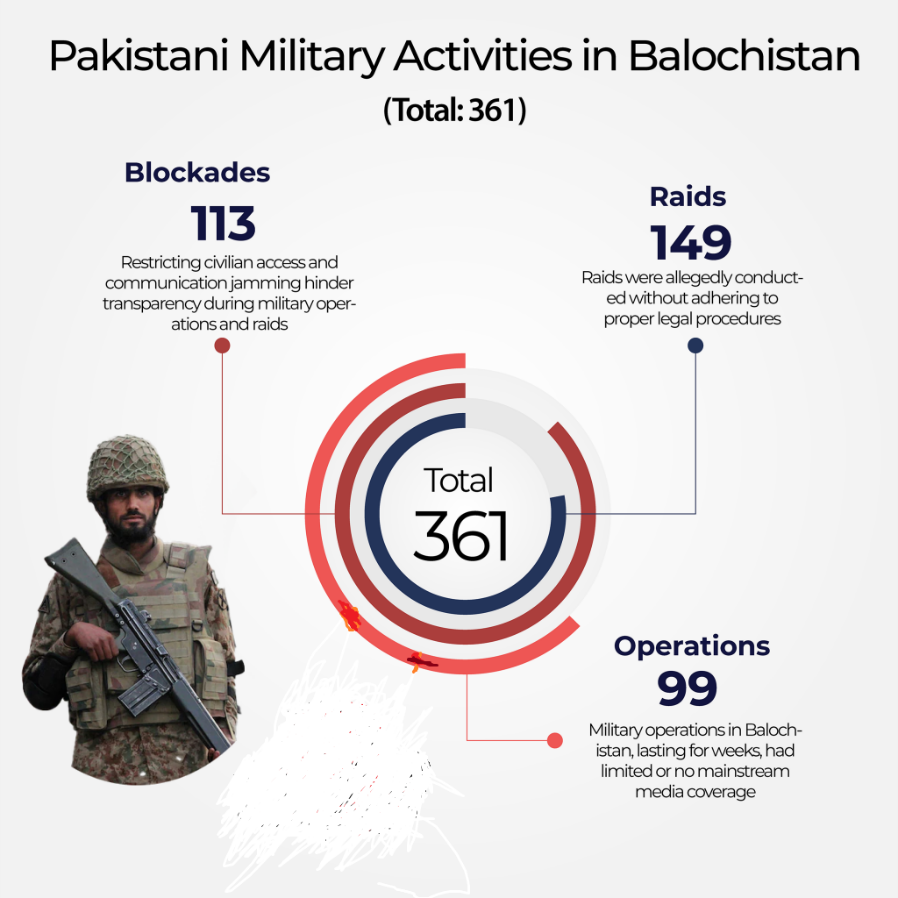Balochistan, a vast and resource-rich province in Pakistan, has long been a battleground between the State of Pakistan and the Baloch people fighting for their right of self-determination. For decades, the Baloch people have fought against perceived injustices and marginalization at the hands of the central government in Islamabad, more particularly at the hands of a brutal army seeking to suppress their voice. At the forefront of this struggle stands, apart from the Baloch Liberation Front (BLF) and the Baloch Liberation Army (BLA), both armed groups advocating Baloch independence. The report here deals with the BLA. Over the past two decades, the BLA has played a significant role in resisting Pakistani control in Balochistan.
Central to the popular resistance in Balochistan today is the issue of enforced disappearances, with the Pakistan army and its intelligence agency, the Inter-Services Intelligence (ISI), frequently accused of abducting Baloch activists and youths. These disappearances have fueled resentment and served as a catalyst for insurgency in the region. For the last over two decades, the BLA has taken up arms to challenge what it perceives as the oppressive Pakistani state apparatus. Over the last few years, the BLA has been split into factions, but the main faction of BLA supposedly led by followers of Aslam Baloch, who died in a suicide attack on 25 December 2018 in Kandahar, has led the armed insurgency against the Pakistan state. The Pakistan Army's brutality is evident in its actions during the first half of this calendar year as per the claims made by the outfit in social media. It has conducted 361 operations in Balochistan, including 149 raids, 113 checkpoints, and 99 military engagements. Some of these operations led to prolonged military blockades, such as the 20-day blockade in certain areas of Bolan.

In recent years, the BLA has escalated its campaign against Pakistani security forces, launching audacious attacks aimed at weakening the military's grip on Balochistan. One such operation, 'Operation ZirPahazag,' captured international attention for its scale and coordination. This meticulously planned assault targeted the PNS Siddique Naval Airbase in Turbat, resulting in significant casualties among Pakistani military personnel. The success of 'Operation ZirPahazag' underscored the BLA's determination and capability to challenge the Pakistani military's dominance in Balochistan. The BLA's strategic approach to warfare was evident in the execution of 'Operation ZirPahazag.' Led by the ferocious Majeed Brigade, a specialized unit within the BLA, the operation involved highly trained operatives launching a coordinated assault on the naval airbase. The attackers, known as 'fidayeen,' displayed exceptional tactical prowess as they infiltrated the heavily fortified base and inflicted substantial damage on military assets. The operation not only targeted the immediate military infrastructure but also aimed to disrupt Pakistan's strategic interests in Balochistan.
Despite the success of 'Operation ZirPahazag' from the BLA's perspective, the aftermath revealed the human cost of the conflict. Several Pakistani security personnel lost their lives in the attack, further exacerbating tensions in the region. The casualties served as a reminder of the human toll of the Balochistan conflict and underscored the need for a peaceful resolution to the longstanding grievances of the Baloch people. Beyond the immediate military objectives, 'Operation ZirPahazag' held broader strategic significance for the BLA. In its statements following the operation, the BLA articulated its broader objectives, including safeguarding Balochistan's resources from exploitation and challenging foreign involvement in the region. The BLA's resistance to projects like the China-Pakistan Economic Corridor (CPEC) exemplifies its commitment to preserving Balochistan's sovereignty and natural wealth.
The BLA's defiance extends beyond its military operations to its political and diplomatic maneuvers. In its interactions with foreign powers, particularly China, the BLA has sought to highlight the plight of the Baloch people and garner international support for their cause. By repeatedly targeting Chinese interests in Balochistan, the BLA aims to pressure China into reconsidering its support for Pakistan and aligning with the Baloch struggle for independence. It must be mentioned here that Aslam Baloch’s son Rehan had attempted a suicide attack on a bus carrying Chinese personnel in August 2018. In April 2022, On 26 April 2022, Shari Baloch, a 30-year old science teacher and mother of two, carried out a suicide attack in the University of Karachi in Pakistan, killing three Chinese teachers. In August 2023, BLA rebels ambushed a convoy of 23 Chinese engineers in Gwadar with a roadside bomb blast before opening fire on them. In March 2024, Gwadar port, operated by the Chinese was attacked by BLA’s Majeed Brigade killing six security personnel. In response to the BLA's actions, the Pakistani government has intensified its crackdown on Baloch insurgents, employing both military force and diplomatic pressure to suppress the insurgency. However, the root causes of the conflict remain unaddressed, perpetuating a cycle of violence and resistance in Balochistan. The BLA's continued resilience and determination underscore the complexity of the Balochistan conflict and the challenges facing efforts to resolve it peacefully.
Moving forward, a sustainable resolution to the Balochistan conflict requires meaningful dialogue and engagement with all stakeholders, including Baloch nationalist groups like the BLA, the BLF and other such outfits, who have been forced, as per their own accounts, to take up arms because the state has used overwhelming force to stamp out their grievances and eliminate them rather than addressing their concerns in an empathetic manner. Addressing the grievances of the Baloch people, including issues of socio-economic development, political representation, and cultural rights, is essential to achieving lasting peace in the region. Until then, the struggle for self-determination in Balochistan will persist, fueled by the determination of groups like the BLA to resist perceived oppression and assert the rights of the Baloch people.
Dr. Syed Eesar Mehdi is a Research Fellow at International Centre for Peace Studies, New Delhi, India



Comments